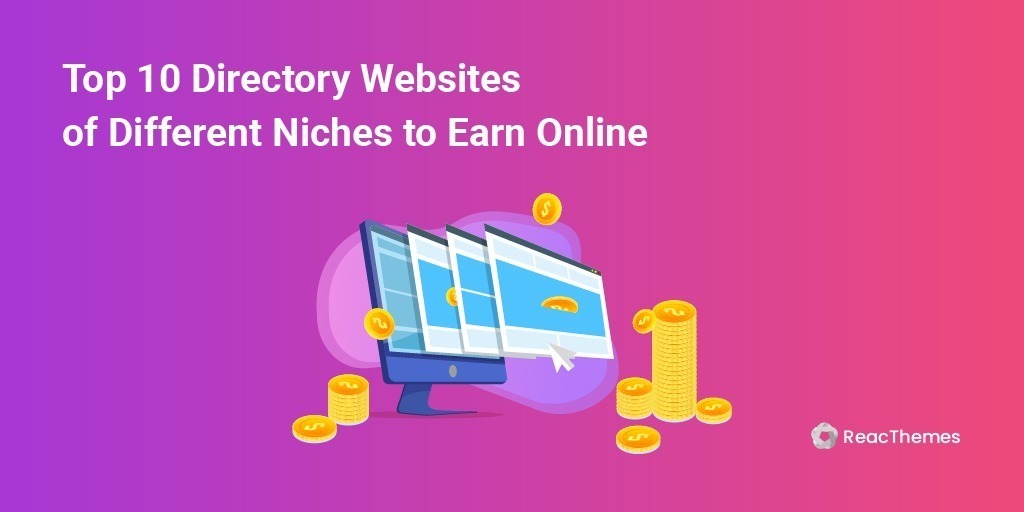We live in a world where information is king and directory websites are the gatekeepers. They hold the keys to finding businesses, services, and products in every imaginable niche. And for those who know how to build and monetize a directory website, the rewards can be great.
Imagine being able to earn money from every click, every lead, and every sale that comes through your directory. Again, imagine being able to build a passive income stream that can last for years to come.
Now, if you’re looking for a way to make money online, directory websites are a great option. But it’s not easy. It takes time, effort, and dedication to build a successful directory website. But if you’re willing to put in the work, the rewards can be truly amazing.
So what are you waiting for? Start your journey to directory website success today. But before moving deeper, let me give you some words about directory websites and niche websites.
What Are Directory Websites?
Directory websites are online platforms that serve as a centralized hub for various categories of information. They act as virtual directories, organizing and categorizing listings based on specific criteria. These websites can range from general directories that cover a wide range of topics and industries to niche-specific ones that focus on a particular industry or interest.
One key advantage of directory websites is their convenience and efficiency in finding the desired information. Users can quickly search for specific businesses, services, or products within their area without having to sift through numerous search engine results. Directory websites also provide additional details such as contact information, user reviews, ratings, and other relevant data to assist users in making informed decisions.
Moreover, directory websites offer tremendous benefits for businesses looking to increase their online visibility. By listing their company on these platforms, businesses gain exposure to potential customers who are actively searching for products or services related to their industry. This not only boosts brand awareness but also improves website traffic and overall online presence.
Finally, directory websites play a vital role in connecting people with the information they need while providing businesses with an effective marketing tool. Whether you’re searching for local restaurants or looking to promote your own business, these platforms offer valuable assistance by simplifying the search process and fostering connections between consumers and service providers alike.
What Is a Niche Site?
A niche site refers to a website that focuses on a specific, narrow topic or subject area, commonly known as a “niche.” Unlike general websites that cover a wide range of topics, niche sites aim to cater to a particular audience with a specialized interest. The content on niche sites is highly targeted and relevant to the chosen niche, which can vary widely – from topics like fitness, gardening, and pet care to more specific areas like vegan baking, antique coin collecting, or drone photography.
How to Pick a Niche That’s Good for Your Business
Choosing the right niche for your business is a critical step that can significantly impact your success. Here’s a step-by-step guide to help you pick a niche that’s good for your business.
Self-reflection and passion
Start by considering your own interests, passions, and expertise. Running a business in a niche you’re passionate about can make the journey more enjoyable and sustainable. Make a list of topics, industries, or areas that genuinely excite you.
Market research
Conduct thorough research to identify potential niches that have demand and growth potential. Look for trends, gaps in the market, and underserved segments. Explore online forums, social media groups, and industry publications to understand what people are talking about and what problems they need solutions for.
Target audience
Define your ideal customer persona. Understand their demographics, preferences, pain points, and behaviors. Knowing your target audience well will help you tailor your products or services to meet their specific needs.
Competition analysis
Analyze your potential competitors within the chosen niche. Identify their strengths, weaknesses, pricing strategies, and unique selling points. This analysis will help you position your business effectively and find areas where you can differentiate yourself.
Profitability assessment
Evaluate the potential profitability of your chosen niche. Consider factors like the price point of products/services, potential sales volume, production costs, and margins. A niche might be appealing, but if it’s not financially viable, it might not be the best choice for your business.
Longevity and trends
Choose a niche that has long-term viability. Avoid niches that are purely trendy and might fade away quickly. Look for niches that have consistent demand and the potential to evolve over time.
Passion meets demand
Ideally, find the intersection between your passion and a niche with demand. This balance will ensure you’re excited about your business while also addressing the needs of your target audience.
Unique value proposition (UVP)
Determine what makes your business unique in the chosen niche. Your UVP is what sets you apart from competitors and gives customers a reason to choose your products or services.
Testing and Validation: Before fully committing, consider conducting a soft launch or testing the waters with a smaller-scale offering. This will help you gather feedback, make improvements, and validate whether your chosen niche is indeed a good fit.
Scalability and growth
Assess whether your chosen niche has the potential for scalability and growth. You don’t want to be limited by a niche that has a limited audience or market size.
Legal and ethical considerations
Ensure that your chosen niche doesn’t involve any legal or ethical issues that could negatively impact your business reputation or lead to legal complications.
Flexibility
While focusing on a specific niche is important, also consider some flexibility. Market conditions can change, and having room to pivot or expand your offerings slightly can be beneficial in the long run.
Top 10 Directory Websites of Different Niches
Let’s get into the details of some top directory websites of different niches so that you can have a complete idea of these sites.
1 . Google My Business
Google My Business, often referred to as GMB, stands as the quintessential local business directory. With its extensive reach and integration into Google’s ecosystem, GMB empowers businesses to establish an online presence by creating detailed profiles. These profiles include essential information like address, phone number, hours of operation, photos, and customer reviews. Leveraging GMB improves a business’s visibility on Google Search and Maps, connecting them with potential customers actively seeking local products and services.
2 . Yelp
Yelp, a pioneering platform, has revolutionized how customers discover and interact with businesses. This directory excels in delivering comprehensive information, including user-generated reviews, ratings, photos, and menus for restaurants, retail stores, service providers, and more. The robust review system aids consumers in making informed decisions while promoting transparency and accountability among businesses.
3 . TripAdvisor
For travelers worldwide, TripAdvisor is the ultimate compass. This directory spans hotels, restaurants, attractions, and travel services, presenting travelers with an extensive array of reviews, rankings, and insights. Whether you’re planning a weekend getaway or a grand expedition, TripAdvisor’s wealth of information helps you make the most of your travel experiences.
4 . Angie’s List
When it comes to home improvement and professional services, Angie’s List is the gold standard. This directory allows users to find highly rated service professionals, contractors, and tradespeople. Beyond basic contact details, users can delve into detailed reviews, ratings, and even before-and-after project photos. By facilitating trustworthy connections between consumers and service providers, Angie’s List streamlines the process of home improvement projects.
5. Zillow
Zillow has transformed the real estate landscape, becoming a one-stop shop for all things property-related. From homes for sale and rent to property values and market trends, Zillow provides comprehensive data that empowers both buyers and sellers. This directory’s interactive maps, virtual tours, and detailed listings redefine how people explore and engage with the real estate market.
6. IMDb
IMDb stands as the internet’s most comprehensive resource for all things entertainment. With an extensive database covering movies, TV shows, actors, directors, and more, IMDb offers fans a treasure trove of information. From the latest blockbuster releases to classic films,
IMDb’s user-friendly interface ensures that enthusiasts can dive deep into their favorite media.
7. Etsy
Etsy is a virtual marketplace where creativity thrives, and unique, handmade, and vintage goods find their new homes. This directory provides artisans, crafters, and vintage collectors a platform to showcase their wares, connecting them with a global audience. Shoppers seeking distinctive, personalized items can browse through an eclectic array of products, supporting independent creators in the process.
8. Behance
Behance serves as a showcase for creative professionals across a multitude of disciplines, including graphic design, illustration, photography, and more. Through portfolios, projects, and collaborations, Behance offers a glimpse into the minds of creative visionaries. The directory facilitates connections between artists, employers, and enthusiasts, fostering inspiration and innovation.
9. Healthgrades
Healthgrades is a vital resource for individuals seeking healthcare providers and medical information. This directory features detailed profiles of doctors, hospitals, and clinics, along with patient reviews and ratings. By offering insights into healthcare quality, specialties, and patient experiences, Healthgrades empowers patients to make informed decisions about their medical care.
10. Dribbble
Dribbble serves as a premier platform for designers to showcase their portfolios, interact with peers, and gain exposure. Designers across disciplines such as UI/UX, web, graphic design, and more can exhibit their work, fostering a community of creativity. Through project sharing and networking, Dribbble has become a hub where design enthusiasts can find inspiration and connect with talented professionals.
Frequently Asked Questions (FAQs)
1. How do directory websites make money?
Directory websites can generate revenue through various methods such as charging businesses for premium listings, offering featured placements, running ads, offering subscription plans, and selling data insights to advertisers.
2. What are the benefits of starting a directory website?
Starting a directory website can provide passive income, as businesses are often willing to pay for increased exposure. It also offers a valuable resource to users seeking specific information in a niche.
3. What are some popular niches for directory websites?
Popular niches include local business directories, job boards, real estate listings, travel and tourism guides, restaurant and food directories, healthcare providers, educational institutions, and event directories.
4. How do I attract businesses to list on my directory website?
You can attract businesses by offering free basic listings, showcasing the benefits of premium listings (such as higher visibility and better positioning), promoting your website through social media and online marketing, and emphasizing the targeted audience your directory reaches.
5. What features should a directory website have?
Essential features include easy search and filter options, user-friendly submission forms, clear categories, and subcategories, user reviews and ratings, contact information, interactive maps, and responsive design for mobile devices.
6. How can I drive traffic to my directory website?
Implement SEO strategies to rank higher on search engines, create valuable content related to your niche, use social media marketing, collaborate with influencers or industry experts, and consider running targeted online ads.
7. Should I allow user reviews on my directory website?
Yes, user reviews provide authenticity and help users make informed decisions. They can also attract more traffic and engagement to your website.
8. How can I ensure the quality of listings on my directory website?
Implement a verification process for businesses before listing, allow user-generated reports on inaccurate or outdated information, and regularly update and maintain your directory’s content.
9. What are some potential challenges of running a directory website?
Challenges include competition from established directories, maintaining the accuracy and relevancy of listings, building initial traffic, and balancing monetization without overwhelming users with ads.
10. Is it necessary to have coding skills to create a directory website?
While coding skills can be helpful, there are many user-friendly content management systems (CMS) and website builders that allow you to create directory websites without extensive coding knowledge.
11. How long does it take to start earning from a directory website?
The time it takes to start earning varies based on factors like niche competition, marketing efforts, and the quality of your website. It might take a few months to a year to see significant earnings.
12. Can I run a directory website as a part-time venture?
Yes, many people run directory websites as a part-time venture, especially when starting. As your website gains traction, you can decide whether to invest more time and resources into it.
13. How do I handle user data and privacy on my directory website?
Implement a privacy policy that outlines how user data is collected and used. Ensure compliance with data protection regulations, like GDPR, and take necessary security measures to protect user information.
Ringing The Bell
Directory websites are a valuable resource for individuals looking to earn money online in various niches. Whether you are a freelancer, a small business owner, or an expert in a specific field, these platforms offer a convenient way to showcase your skills and connect with potential clients.
By utilizing the features and tools provided by directory websites, you can increase your online visibility and attract more opportunities for earning income. So why wait? Start exploring the different directory websites available today and take advantage of the vast earning potential they offer. Don’t miss out on the chance to turn your passions and expertise into a profitable online venture.








